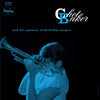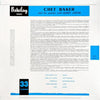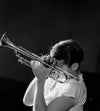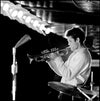







Chet Baker and his Quintet with Bobby Jaspar – Chet Baker in Paris, Vol 3 (Mono)
ORDER LIMITED TO ONE ITEM PER CUSTOMER
Trumpet – Chet Baker [click here to see more vinyl featuring Chet Baker]
Tenor Saxophone – Bobby Jaspar (A1, A3) [click here to see more vinyl featuring Bobby Jaspar]
Tenor Saxophone - Armand Migiani (A5, B1, B4), Jean-Louis Chautemps (B2)
Bass – Benoit Quersin (A1-5, B1, B4-5), Eddie De Haas (B2-3)
Drums – Jean-Louis Viale (A1-4, B5), Pierre Lemarchand (A5, B1, B4), Charles Saudrais (B3)
Piano – René Urtreger (A1, A3), Raymond Fol (A2, A4, B5), Francy Boland (A5, B1-4)
Alto Saxophone – Teddy Hameline (A5, B4), Jean Aldegon (B1), Teddy Hameline (B1), Jean-Louis Chautemps (B3)
Baritone Saxophone – William Boucaya (A5, B1, B4
Trombone – Benny Vasseur (A5, B1, B4)
1 LP, Facsimile reissue using the original photo by Jean-Pierre Leloir for the back cover (front photo is lost) and orange Polydor labels, with double insert using an original photo from the session.
Limited to 1,000 copies
Original analog Master tape : YES
Heavy Press : 180g
Record color : black
Speed : 33 RPM
Size : 12'’
Mono
Studio
Record Press : Optimal in Germany using the Metal Mothers from Pallas
Label : SAM Records
Original Label : Barclay
Recorded at Studio Pathe-Magellan in Paris on November 28, 1955 (A2, A4, B5), December 26, 1955 (A1, A3), February, 10, 1956 (B2, B3), and March, 15, 1956 (A5, B1, B4)
Released in 1958
Reissued in 2021
Tracks:
Side A
- How About You?
- Once in a While
- Chekeetah
- Alone Together
- Chet
Side B
- Dinah
- Tasty Pudding
- Anticipated Blues
- V-Line
- Exitus
Reviews :
« Chet Baker and His Quintet with Bobby Jaspar is basically an inaccurately titled compilation. Baker spent a great deal of time in Europe in late 1955 and through the first third of 1956, and recorded often. The music on this CD was compiled from a few different sessions recorded in Paris during November of 1955 and February of 1956; only the latter date contains Jaspar on tenor, along with René Urtreger on piano, with bassist Benoit Quersin and drummer Jean-Louis Viale. The earlier session features Baker leading an octet that includes bassist Jimmy Bond, a saxophone section, and a different rhythm section under the direction of Pierre Michelot. Sloppily curated compilations like this understandably drive collectors nuts, even when the music is terrific, as it is here. The credits list Baker on vocals as well as trumpet, though he only sings on a by then very familiar arrangement of "Everything Happens to Me," tacked on as a bonus cut. Other standouts include "Alone Together," "How About You?," "Once in a While," and the strutting, muscular blues "Exitus." » AllMusic Review by Thom Jurek
In answer to an offer from Nicole Barclay, Chet Baker arrived in Paris early in September 1955. On the 22nd – or maybe the 23rd – he signed a contract to make seven records… (The figure was later erased and replaced by «three», which turned out to be correct). Released after the trumpeter’s return to the USA, this last volume was construed as rather a poor relation opposite the others in the trilogy, all the more so because, hurriedly drafted, the sleeve-notes did little to render unto Caesar the things which were Caesar’s. Unlike the earlier opuses, this one was in no way a concept-album: it contented itself with a simple overview of Chet’s Parisian associations, depending on where his fancies took him in the course of his stay. When Chet entered the Studio Pathé-Magellan on October 25th, only one member of his original accompanying trio was still present: pianist Dick Twardzik had died of an overdose, and drummer Peter Littman had returned home after selling his kit for whatever it would fetch. Jimmy Bond and his contrabass, however, were both still there, and in the ensuing octet session Chet’s melodic gifts were magnified by (remarkable) scores penned by Pierre Michelot – ‘Chet’, ‘Dinah’ – and Christian Chevalier ‘Vline’. The three pièces were mini-concertos, and the trumpeter loved them so much that he decided to do them again back in America… but not so successfully. On November 28th Chet went back into the same studio, this time with Raymond Fol on piano, Benoît Quersin on bass and Jean-Louis Viale on drums. They recorded two improvisations: the first was based on a 1932 standard from Howard Dietz and Arthur Schwartz, ‘Alone Together’, while the second began with ‘Exitu’s, a composition written by one of Baker’s friends, Phil Urso. The performances are among the most beautiful that Chet produced during this period, along with ‘Chekeetah’ – or ‘Chik-Etah’ – and ‘How about You?’ which put the seal on a partnership that had first come to light at the Club Saint-Germain, temporarily rechristened for the occasion: «Every Saturday and Sunday afternoon from 16h30 to 19h30 at the Barclay’s Club – 13 rue Saint-Benoît, Paris – Bobby Jaspar Quintet with American trumpeter Chet Baker,» read the sign. The format was stylistically ideal, leading Chet to abandon the quartet format he’d preferred up until then. To respect his next bookings, Chet had to get a stable band together, and as his pianist he chose Raph Schecroun – later known as Errol Parker – who was himself replaced by Francy Boland. Alongside him were bassist Eddie de Haas, who’d previously been with Martial Solal and Henri Renaud (the latter, in the adventure, also lost his regular drummer, Charles Saudrais, who was just seventeen. According to Jean-Louis Chautemps, “When Bobby Jaspar couldn’t do it or just wanted too much, they looked for someone cheaper; and that was me. There wasn’t really an audition: we were in the Tabou, I played with Chet, he said OK and, two days later, we found ourselves in Reykjavik, Iceland.” The tune ‘Tasty Puddin’g written by Al Cohn and ‘Anticipated Blues’, one of the rare pieces Chet claimed to have written, were in the repertoire played by this last Baker-led formation on the Old Continent.
Ratings :
AllMusic : 3 / 5 , Discogs : 4.75 / 5


